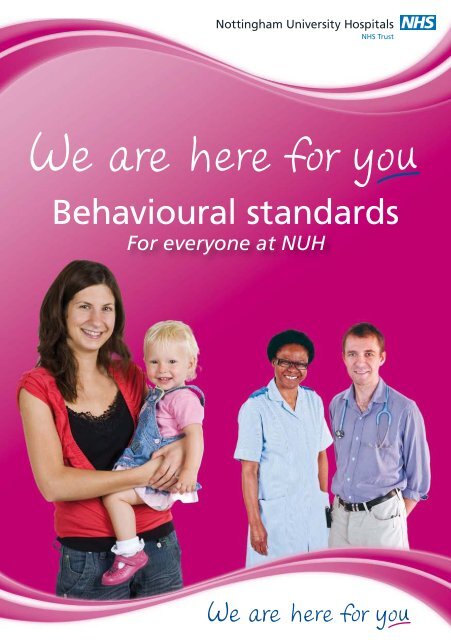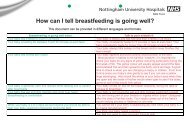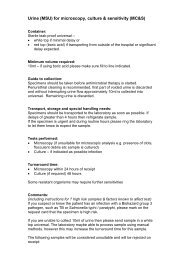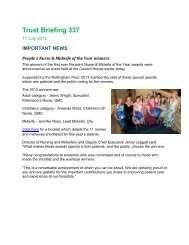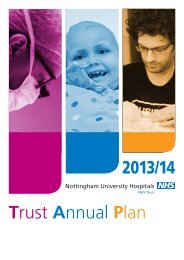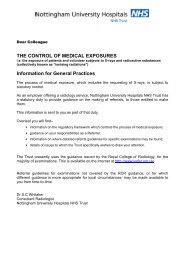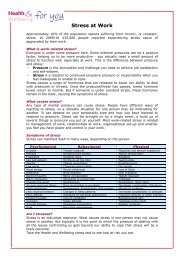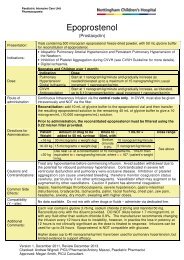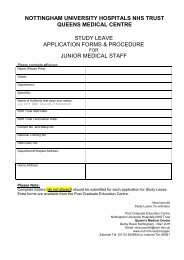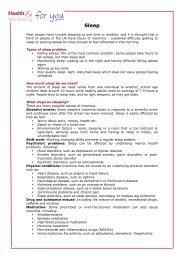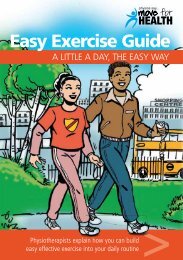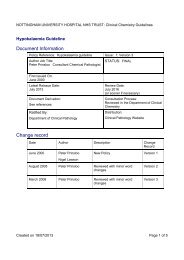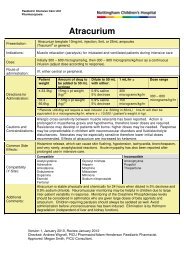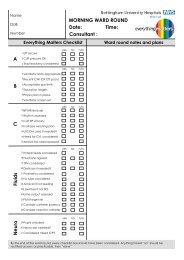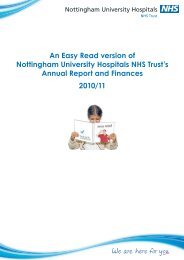Behavioural standards - Nottingham University Hospitals NHS Trust
Behavioural standards - Nottingham University Hospitals NHS Trust
Behavioural standards - Nottingham University Hospitals NHS Trust
- No tags were found...
Create successful ePaper yourself
Turn your PDF publications into a flip-book with our unique Google optimized e-Paper software.
<strong>Behavioural</strong> <strong>standards</strong>For everyone at NUH
<strong>Behavioural</strong> <strong>standards</strong> for everyone at NUH42
<strong>Behavioural</strong> <strong>standards</strong> for everyone at NUH‘We are here for you’ behavioural<strong>standards</strong>These behavioural <strong>standards</strong> have been developedwith the staff and patients of <strong>Nottingham</strong><strong>University</strong> <strong>Hospitals</strong> <strong>NHS</strong> <strong>Trust</strong>, to help us supporteach other to deliver the consistently high qualityservice our communities deserve. The <strong>standards</strong>apply to all of us, and are a part of everybody’sjob.They are always herefor me. I feel cared for,safe and confident.3
ContentsContents1. Introducing ‘we are here for you’ p 42. A pledge to our patients p 103. Our behavioural <strong>standards</strong>... p 12...so people feel cared for p 16...so people feel safe p 22...so people feel confident p 28...and always improving p 344. When it’s really important p 365. Working together p 386. Making it happen p 403
<strong>Behavioural</strong> <strong>standards</strong> for everyone at NUHIntroducing ‘we are here for you’At <strong>Nottingham</strong> <strong>University</strong> <strong>Hospitals</strong> we are committed toproviding the highest quality of care to our patients. Ourpledge to each of our patients is ‘we are here for you’.Our vision is to be England’s best acute teaching <strong>Trust</strong> by2016. We believe our patients deserve nothing less thanthis. By continual engagement with our patients, staff andpartners we will transform our organisation into one wherecontinuous improvement is natural and self generating.The ‘we are here for you’ programme will help us toprogress our 2016 vision. It started by listening to patientsand staff to understand what quality really means to them.They told us that our patients should always feel cared for,safe and confident in the treatment they receive.This feedback from patients and staff has been translatedinto 12 behavioural <strong>standards</strong>. The <strong>standards</strong> also includeour commitment to each other – as colleagues – to do ourbest to ensure we are each appreciated, supported andencouraged in our work. All of the <strong>standards</strong> are includedand explained in this booklet.Each of us at NUH has a unique role to play in the future ofthis organisation. By working together we will demonstrateour commitment to the ‘we are here for you’ pledge to ourpatients and their families.Dr Peter BarrettChairmanDr Peter HomaChief Executive4
<strong>Behavioural</strong> <strong>standards</strong> for everyone at NUH‘We are here for you’ in all we sayand doBeing here for patients means being thoughtful about thepractical things we say and do as we go about our work.In patients’ shoesWorking in hospital every day it’s easy for us to forget it’svery different for patients, who come into hospital seldomand are often anxious and in pain. A visit to hospital may bea tense moment. Often someone we perceive as ‘difficult’ isactually scared. By imagining what it’s like in their shoes webuild empathy and can diffuse difficult situations.Little things make a big differenceWe only get one chance to make a good first impression.When patients are worried, the smallest things can havethe biggest impact on whether they feel cared for, safe andconfident in their treatment.Choose a positive attitudeHow we treat patients as people has a real impact on theiroutcomes. We can choose the tone of voice and bodylanguage we use as well as what we actually say and do.Every one of us can take responsibility for what we do to behere for patients.Consistency creates qualityMany of us are already role models in the service we give toour patients. But to achieve the quality to which we aspireto for our patients, every one of us needs to deliver our<strong>standards</strong> consistently in everything we do.8
Introducing ‘we are here for you’In a series of In Your Shoes sessions. We asked patientsabout their experiences in our hospitals, to build on and toimprove ourselves. This is what they said...Her kindness madeall the difference atwhat was anincrediblyfrightening time.I was told not to ringwant to be a bother.I had a soiledsheet for hours.Waiting behind acurtain without anyinformation waslonely and scaryWhen she said shewas busy, it made meworry about whatthey might miss whenit was important.Their professionalismand attention todetail made meI was in good hands.Staff were talkingabout inappropriatethings. Theymy care.We were all bookedin at the same timebut I was last in. Itwas a long day.The nurse was sorough giving a bedit made me cry.Just taking time tolisten to myconcerns reducedmy anxiety.9
<strong>Behavioural</strong> <strong>standards</strong> for everyone at NUHA pledge to our patientsWe want our patients and their families to feel safe, caredfor and confident in their treatment.We want them to feel that each one of us is here for them.I want to feel that you arehere for me, becausethat helps me feel better.We want to demonstrate our commitment to patients bymaking a promise that we will do all we can to make themfeel safe, cared for and confident every time they accessservices at NUH.Most of us already put patients first much of the time. Therole of the ‘we are here for you’ behavioural <strong>standards</strong> inthis handbook is to help us do so consistently - all of us, inall we do, all of the time.10
A pledge to our patientsOur pledge to patients...At <strong>Nottingham</strong> <strong>University</strong> <strong>Hospitals</strong> weare here for you. We pledge to you thatall day, everyday, we will all do our verybest to ensure:• You are cared for, politely andrespectfully by kind and helpful staff,who have the time to listen to you andkeep you informed at every step• You are safe in clean and comfortablefacilities, with highly professional teamswho work together to make sure you arein safe hands• You are confident in your treatment,provided by well-trained, skilled andcompassionate teams, who involve youin your care and appreciate the value ofyour time11
<strong>Behavioural</strong> <strong>standards</strong> for everyone at NUHShowing patients ‘we are here foryou’These ‘we are here for you’behavioural <strong>standards</strong> havebeen developed togetherwith more than 1,000 staffand patients.They can help us to be moreconsistent in what we do andsay to help people to feelcared for, safe and confidentin their treatment.The <strong>standards</strong> apply to ourbehaviour, not only withpatients and visitors but withall of our colleagues too.KSF CD1 CommunicationKSF CD6 Equality & diversityYou are cared for, politely andrespectfully by kind and helpfulstaff, who have the time to listen toyou and keep you informed atevery step.1. Polite & respectful2. Communicate & listenThey apply to all of us, everyday, in everything that wedo, and so are integratedinto job planning and theCore Dimensions (CD) of thenational Knowledge andSkills Framework (KSF).Each team should think abouthow these <strong>standards</strong> can beapplied to your work withthe patients and families youserve, for example with olderpeople, children, or peoplewith learning disabilities.3. Helpful & kindKSF CD4 Service10. Accountable12
A pledge to our patientsKSF CD3 SafetyKSF CD5 QualityYou are safe in clean andcomfortable facilities, with highlyprofessional teams who worktogether to make sure you are insafe hands.You are confident in yourtreatment, provided by welltrained,skilled andcompassionate teams, whoinvolve you in your care andappreciate the value of your time.4. Vigilant (safe) 7. Informative5. On stage (feel safe) 8 . Timely6. Speak up (stay safe) 9 . CompassionateImproving is everyone’s jobimprovement & KSF CD2 Personal development11.Best use of time& resources12. Improve: our bestgets better13
<strong>Behavioural</strong> <strong>standards</strong> for everyone at NUHWe are here for each other tooAs Lord Darzi’s Next stage Review final report ‘High QualityCare for All’ says: “Healthcare is delivered by a team. Theteam includes clinicians, managerial staff and those insupporting roles. All members of the team are valued.Every member of the team must be pulling in the samedirection.”Standards apply equally tocolleaguesOur ‘we are here for you’behavioural <strong>standards</strong> applyjust as much to how wework with each other asthey do to how we behavewith patients.By creating a safe,supportive and honestworking environment;by caring for each other,listening and being helpful;and by working together,valuing each other’stime and contribution,we can create a workingenvironment in which everymember of staff can thrive.1. Polite & respectfulPolite and respectful of everyindividual in our team. Notbullying, discounting or ignoring2. Communicate & listenasking open questions; keepthem in the loop3. Helpful & kindWe should all be someone ourcolleagues can rely on (whoeverthey are / whatever their role)10. AccountableTake responsibility for our ownactions and results14
A pledge to our patientsAll of us, whether we are in patient-facing roles or providesupporting services, have a part to play in providing highquality care to our communities. These <strong>standards</strong> are abouthow we treat each other too.4. Vigilant (safe) 7. InformativeAll contributing to a safe and tidywork environment; not expectingothers to tidy up after usInvolve colleagues in the serviceyou deliver with, or for, them, so5. On stage (feel safe) 8 . TimelyProfessional in all our dealingswith colleagues, and supportivetime to meetings; and deliver toagreed deadlines6. Speak up (stay safe) 9. CompassionateSpeak up for our <strong>standards</strong> whenappreciative when they do11. Best use of time& resourcesSimplify processes and eliminatewaste, while improving qualityAcknowledging our jobs can bedifficult - supporting colleagues12. Improve: our bestgets betterWorking in teams to innovateand to solve patient frustrations15
<strong>Behavioural</strong> <strong>standards</strong> for everyone at NUH1. Polite & respectfulWhatever our role, we are polite, welcoming and positive inthe face of adversity, and are always respectful of people’sindividuality, privacy and dignity.Hello, I’m JaneSmith. I’m aphysiotherapist.I’m here to helpyou get back tofull fitness.Patients are often anxious when we first see themso we always give a polite and positive welcome.16
...so people feel cared forDo...Positive welcome• Give an instant welcome, makeeye-contact, appropriate smile• Everybody - introduce yourself byname, role and what you are goingto do (in person and on the phone)• Open body language, tone of voice• Say hello to colleagues too“Are you being looked after?”“Hello, I’m Mr Smith, I’m here to...”Don’t...• Make people wait more than 10seconds to know you’ve seen them– whether a patient or a colleague• Grow our own difficult patients byavoiding, eye-rolling or tutting• Arms crossed, disinterested tone• Answer phones casually… “Hello”“Yes?!?”“…” (Leave people waiting.)Respect for individuals• Talk directly with, not over, people• Ask permission e.g. using ‘may I’before anything you do• Use the name patients prefer• Use common courtesies like‘please’, ‘thank you’ and ‘after you’• Respect different cultures / beliefs“May I come in, Mrs Jones?”• Talk over patients, or depersonalisethem as a condition or ‘a breach’• Assume you can ‘do to’ peoplewithout their permission• Use belittling / over-familiar namese.g. ‘love’, ‘duck’, ‘sweetheart’,‘dear’• Treat colleagues as invisiblebecause you are more senior thanthem“So you’re the knee are you?”Privacy and dignity• Imagine what it’s like in their shoes• Respect people’s dignity byimagining what you would wantfor your family• Respect privacy and confidentiality“I can imagine that was upsetting.”“I’ll check the curtains are closed.”• Forget patients are all people• Embarrass a patient or colleague infront of other patients or staff“Come and look at this prolapse.”“Get undressed and wait for the Dr.”17
<strong>Behavioural</strong> <strong>standards</strong> for everyone at NUH2. Communicate & listenWe take the time to listen, asking open questions to hearwhat people say; and keep people informed of what’shappening; providing smooth handovers.What elsecan I do foryou?Patients don’t want to be a bother, so we alwaysask open questions and keep them in the loop.18
...so people feel cared forDo...Listen - ask open questions• Ask open questions: starting with‘how’ or ‘what’ e.g. ‘How can Ihelp?’ or ‘How are you feeling?’• Really listen to and hear the answer• Open body language shows youhave time to listen to people“How are you feeling now?”Don’t...• Ask closed questions startingwith ‘is’, ‘are’, ‘do’ or ‘can’ whichpeople can answer with just ‘yes’or ‘no’ (other than when clinicallynecessary)• Assume you know their answer• Give mixed messages (e.g. look atwatch)“Are you feeling alright now?”In the loop• Let people know what’s happeningnow, and what will happen next• Keep people in the loop when theyare waiting e.g. a late running clinicor waiting for a doctor• Make it easy for people to receivethe information. Use their choice ofmedia• Include young people and patientswith dementia in discussions, up totheir level of understanding“We are running about 15 minutes late.”“I haven’t forgotten you.”• Leave patients waiting / worryingwithout knowing what’s going on• Ignore patients who are out ofsight (e.g. behind a curtain) orwaiting patiently to be seen• Just send an email or a letter simplybecause it’s easier for you• Forget there’s a range of ways tocommunicate with people“…” (saying nothing)“I sent you an email about this.”Smooth handovers• Ensure you know what the rest ofthe team knows e.g. read notes,ask colleagues for an update• Thoroughly brief anyone picking upfrom you; check later it’s going OK• Let patients see that our teams arecommunicating with each other“Your nurse has updated me.”• Expect a patient to tell you whatthey have already told a colleague• Expect a colleague to pick up fromyou without a briefing, or leave itto them to pick up the pieces• Make patients worry that teamsaren’t communicating“I didn’t have time to read the notes.”19
<strong>Behavioural</strong> <strong>standards</strong> for everyone at NUH3. Helpful & kindAll of us keep our ‘eyes open’ for (and don’t ‘avoid’) peoplewho need help; we take ownership of delivering the helpand can be relied on.Leave thatto me.The real opposite of courtesy is ‘avoidance’ so wekeep our eyes open for people who need help.20
...so people feel cared forDo...‘Eyes open’ for people to helpDon’t...• Look out for people who need helpor who could be more comfortable• Notice the signs e.g. peoplewho seem lost or unsure. Beapproachable• Pro-actively seek out people tohelp eg regular nurse ward rounds• Be vigilant that patients are eating• Volunteers can help to notice howpatients are doing“I’m going that way – I’ll take you there.”• Look the other way or avoid eyecontact to avoid helping people• Wait for (or ignore) the call bell• Ignore patients or colleagues sothey feel invisible or unimportant• Ignore people who need your help“You’re busy with the call bell today.”Take ownership• Be accommodating. Look forsolutions to address people’spractical needs• Respond to people’s needs straightaway, provided it’s safe to do so• If you can’t do it, find someonewho can, and check up later it’sdone“I’ll find the right person to help you.”“I’m going to arrange transport for you”• Assume someone else will do it• Tackle a task you’re not skilled tohandle, or just ignore it• Abdicate responsibility eg “she’snot my patient”“That’s not my job.”“I don’t know.”Keep your promises• Make promises you can keep,and keep them, including thetimeframe• Be someone people can rely on,who does what they say they will• Go the extra mile when it’simportant for patients e.g. food,pain, toilet“Leave that with me.”• Make empty promises, or say you‘might’ be able to help, just to getpeople off your back e.g. promiseto ‘be back in 5 mins’ but neverreturn• Forget small things or informationpatients have asked for• Set unrealistic expectations“I might be able to…”21
<strong>Behavioural</strong> <strong>standards</strong> for everyone at NUH4. Vigilant (patients are safe)Every one of us is vigilant across all aspects of safety,practices hand hygiene and demonstrates attention todetail for a clean and tidy environment everywhere.We need to be clean, andbe seen to be clean.Ensuring patients are safe in our care is our first priority.That means clean hands and a clean hospital.22
...so people feel safeDo...Seen to be clean• Practice hand hygiene; encouragecolleagues / visitors to do so too• Let patients see / know you havecleaned your hands• Show attention to detail in cleaninge.g. ‘clean behind the bin’“I’ve just washed my hands, but I’mhappy to do it again if you want.”Don’t...• Be frustrated with patients if theyask you to clean your hands again• Only clean what’s seen• Eat or drink in clinical areas• Use the same cloths for sinks / bins“I already did wash my hands.”Safe practice• Always put patients’ safety first• Follow all patient safety andinfection control procedures• Speak up if you believe patientsafety is being compromised(outside patients’ earshot to notworry patients)“Nothing is more important than thispatient’s safety .”• Tolerate unsafe practice in anycircumstances eg to meet a target• Criticise others for speaking up onbehalf of patients’ safety“Just let it go this time.”Pride of place• Take pride in having a clean andtidy environment – not just yourarea, and not just the wards - thewhole hospital• A tidy space is also more efficient• Pick up litter; report mess or fullbins• Remember we all have aresponsibility to keep our hospitalsclean“Hang on, I’ll just pick up this litter.”• Just leave rubbish in the corridor• Walk past rubbish, mess or clutterwithout tidying it up; or leave adirty cup for someone else to washup• Leave it for the cleaner if you canclear it up straight away“Just put it in the corridor.”23
<strong>Behavioural</strong> <strong>standards</strong> for everyone at NUH5. On stage (patients feel safe)We imagine anywhere that patients or visitors could see orhear us as a ‘stage’. Whenever we are ‘on stage’ we lookand behave professionally, acting as an ambassador forthe <strong>Trust</strong>, so patients, families and carers feel safe, and arenever unduly worried.Everything Ido affects howpatients feel, sothe moment Iwalk through thedoor, I imagineI’m on stage.People are reassured when we behave professionally,so we always imagine we are on stage.24
...so people feel safeDo...Act professionally• Imagine anywhere patients mightsee or hear us as a ‘stage’ on whichwe must act professionally (e.g.wards, corridors, nurses station,restaurants, Medilink, in uniformon the way home)• Concentrate on work at work• Follow the uniform and work wearpolicy to create an impression ofprofessionalism and cleanliness“I’m not sure that’s appropriate ‘onstage’. Tell me later.”Don’t...• Cause patients to worry unduly,with behaviour they see asunprofessional e.g. criticisecolleagues, processes or theorganisation when ‘on stage’• Make patients feel they don’t haveyour full attention e.g. talkingabout your private life with acolleague, or texting, while caringfor a patient• Argue in front of a patient• Use bad language anywhere onstage“You should have been there last night.”“That team are always a problem.”Never ‘too busy’ to care• Ensure patients feel we have timeto listen / respond to their needs• Keep a positive / calm demeanor infront of patients• Prioritise taking time for patientseven when you are busy“How can I help, I have time.”• Say you are ‘busy’, making patientsworry about quality of care,or keep quiet when they needsomething• Pass your stresses onto patients“You’re not my patient.”“We are rushed off our feet.”Business away from the bedside• Take conversations aboutoperational matters away frompatients’ earshot, so they don’tworry unduly“I’ll just pop into this office so wecan talk about this.”• Have conversations about workthat may cause patients to worry- at the bedside, nurses station oranywhere you can be overheard“I’m two nurses short on the ward.” (Onstagewhere patients might hear.)25
<strong>Behavioural</strong> <strong>standards</strong> for everyone at NUH6. Speak up (patients stay safe)We are confident to speak up if colleagues don’t meetthese <strong>standards</strong>, we are appreciative when they do, and areopen to ‘positive challenge’ by colleagues.It’s important tospeak up if I seepeople not focusedon patients’ needs.To consistently be here for our patients we have tobe honest about the times when we aren’t.26
Speak upDo......so people feel safeDon’t...• Speak up when our <strong>standards</strong>are not being displayed, or whenpatient safety is compromised,straight away (but always outsidepatients’ earshot)• Tactfully and positively feedback toothers as an opportunity to learn• Be appreciative too, when peopledo a good job or go out of theirway“How did that feel to the patient?”• Ignore behaviour that may causepatients to worry or be unsafe• Leave it to someone else to speak• Criticise or judge others’ behaviour• Just speak up around negativeissues – it’s important to beappreciative of good practice (&patients’ efforts) too• Put obstacles in the way ofcolleagues“That’s not my problem / job.”Open to challenge• Accept feedback from others as anopportunity to improve• Accept that consistent <strong>standards</strong>apply to everyone, at all times“Thanks for the feedback. I didn’t realiseI was having that effect.”• Take feedback as criticism• Believe that you can’t changeyour behaviour, or blame otherswhen you could take responsibilityyourself“Who are you to tell me?”“I can’t change who I am.”Apologise• Acknowledge people’s concernsand feelings, when they are upset• We all make mistakes – apologiseand take ownership when you do• Apologise to patients for poorservice even if it’s not your fault“I’m sorry about that. I can see howit has upset you.”• Dismiss other people’s views orfeelings, when they are upset• Tell people to “calm down” (it hasthe opposite effect)• Pass the buck or blame otherpeople, departments, or the <strong>Trust</strong>“It’s not my fault.”27
<strong>Behavioural</strong> <strong>standards</strong> for everyone at NUH7. InformativeWe involve people as partners in their own care, helpingthem to be clear about their condition, choices, care planand how they might feel. We answer their questionswithout jargon. We do the same when delivering services tocolleagues.So that’s what willhappen. What otherconcerns do youhave?When patients are informed and confident intheir treatment, they recover more quickly.28
...so people feel confidentDo...Clear explanations• Use language people understand.Spoken / leaflets• Set clear expectations for patientswith information before each step• Use drawings, diagrams andobjects to explain things, whereit can help, and adapt to age andunderstanding• Recap. Check they’ve understood.“Let me know if there’s anything atall you are not clear about.”Don’t...• Assume people know what ishappening to them• Assume people share your expertlevel of understanding, or yourcommunication abilities• Assume children or people withlearning difficulties will understandthe same information as theircarers• Use jargon/acronyms“I’m busy, but it’s all in the leaflet.”What could happen to me?• Involve people in decisions abouttheir care, and discuss the options• Explain what will happen duringtreatment, and the risks / benefits• Describe how they might feel after• Check patients are clear about theirplan of care, including what willhappen after they are dischargedand what they can do to aid theirrecovery• Assume you know what the patientwill want to do• Assume because you’ve said it, theperson has understood, as theymay be too stressed to take it in“A lot of people feel sick.” ‘”You will feel nauseous.”Any other questions?• Give people a chance to ask alltheir questions: eg ‘what otherquestions do you have?’ Then later- ‘Have you thought of any morequestions?’• Give patients an opportunity totalk about their fears and worries“What other concerns do you have?”• Cut patients off before they haveasked all their questions• Dismiss patients fears (you may seethis everyday, but they don’t)“Any questions?”29
<strong>Behavioural</strong> <strong>standards</strong> for everyone at NUH8. TimelyWe appreciate that other people’s time is valuable, andoffer a responsive service, to keep waiting to a minimum,with convenient appointments, helping patients get betterquicker and spend only appropriate time in hospital.Time is the mostprecious gift wecan give to ourpatients.Every minute is valuable to our patients, sowe strive to provide a timely service.30
...so people feel confidentDo...Prompt attention• Respond as quickly as you can topatients’ needs, provided it’s safe• Prioritise patients over admin thatcould wait for a few minutes• Arrive on time for meetings / clinics• Answer the phone by the 4th ring• Getting it right first time“How can I help you? I can finishup this filing later”Don’t...• Waste other people’s time by beinglate for meetings or appointments• Leave phones unanswered“It’s OK, I’m only a few minutes late.”Value patients’ time over our own convenience• Strive to continuously reducewaiting times for treatment• Look for ways to reduceunnecessary waiting e.g. clinicappointment schedules, or arrivaltimes for theatre• Plan early for smoother discharge• Be honest about delays (not 10mins if it it’s going to be an hour)“It is likely to be an hour I’m afraid. Whatcan I get you while you wait?”• Arrange things for our conveniencee.g. arrive at 8am we’ll see you at 3• Tackling the symptom not the causee.g. double booking patients ratherthan reducing Did Not Attend rates• Make people give the same infomore than once, unless clinicallyrequired“You’ll just have to wait”Give people choice and flexibility• For patients to engage with theirtreatment it has to fit into theirlives• Offer a choice of appointment andvisiting times to suit patients“When would be convenient for you?”• Expect people to go out of theirway to fit into our processes“That’s the only time available.”31
<strong>Behavioural</strong> <strong>standards</strong> for everyone at NUH9. CompassionateWe understand the important role that patients’ andfamily’s feelings play in helping them feel better. We areconsiderate of patients’ pain, and compassionate, gentleand reassuring with patients and colleagues.That’s how I’dwant my mum tobe treated.We can respect our patients’ dignity by imaginingby how we’d want our loved ones to be treated.32
...so people feel confidentDo...Dignity of the whole person• Consider patients’ and family’sfeelings as people – especiallywhen people have had bad news• Imagine what it’s like In Their Shoes• Imagine how you want your mum,dad, sister, son or daughter to betreated• Keep your eyes open for patientsor colleagues who may needcomforting“How are you feeling?”“Would you like me to sit with you?”Don’t...• Treat people as just a condition• Treat everyone in the same way• Assume people would feel thesame as you, or share your views• Think compassion applies only topatients, we need to support ourcolleagues too“I know exactly how you feel.”Gentle• Be gentle, and reduce anxiety bysaying you will be gentle• Let people know you are caring e.g.‘Shall I draw the curtains to giveyou some privacy?’“May I take some blood. It may hurt alittle but I’ll be as gentle as I can.”• Barge in without thought• Think about something else whiledealing with a patient• Allow business or stress to be anexcuse for being rushed and rough“I told you it would hurt.”Pain is personal• Acknowledge that the pain peoplefeel is real to them• Reduce patients’ pain as quickly asyou can and without fuss“Let’s help with your pain now.”• Trivialise the pain a patient isfeeling• Let processes be an excuse forleaving a patient in pain (but doremember to put safety first)• Ignore or avoid patients’ distress“The pain is not so bad, is it?”33
<strong>Behavioural</strong> <strong>standards</strong> for everyone at NUHImproving is everyone’s jobEach one of us looks to simplify processes, eliminatewaste, and increase efficiency while improving patients’experience. We seek out and act to solve patients’frustrations, and take part in evidence-led improvement.We are happy to be measured and held accountable forown role, quality for patients, and <strong>Trust</strong> performance.What frustratedyou about yourexperience today,that we can try toimprove?Continually improving for patients is everyone’sjob. Start by listening to patients’ frustrations.34
...and always improvingDo...10. Accountable & appreciativeDon’t...• Regularly review your performanceand your team, against ‘hard’ dataand patient views• See performance managementagainst our <strong>standards</strong> as anopportunity to improve for patients• Carry out regular appraisals andpersonal development reviews• See feedback and performancemanagement as criticism orbullying• Only measure ‘hard’ data andoutcomes without also valuingpatients’ views on how we perform“Where can we improve?”“That’s just your opinion”11. Make best use of time and resources• Look for ways when the caringthing is also more efficient e.g.right first time, regular nurse wardrounds• Simplify processes, cut out waste“It’ll be quicker to do it right now.”• Think that providing a betterexperience for patients needs totake up more time“I don’t have time to think about how todo things differently.”12. Always improving• Seek out feedback from patients /colleagues to find ways to improve,and act on what you hear• Apply evidence-led best practice toimprove personal / team services• Review incidents and act onlearning“What frustrated you about yourexperience that we can improve?”• See improvement and innovation assomeone else’s job• Think we can’t change thingsbecause they’ve always been donethat way“I can’t change that.”“That’s how we’ve always done things.”35
<strong>Behavioural</strong> <strong>standards</strong> for everyone at NUHIt matters most when it’s difficultOur <strong>standards</strong> are most important at the times when theyare most difficult to deliver. This could be because it’sa difficult moment for the patient, or because it’s mostcomplex or time-pressured for us.36
When it’s really important37
<strong>Behavioural</strong> <strong>standards</strong> for everyone at NUHWe are your biggest supporterBeing here for patients, in everything you do will takecommitment and dedication. We don’t expect you to do, italone, and are making some pledges to you.We will continue to introduce a range of programmes tosupport individuals and teams in delivering the best patientsafety, experience and outcomes. Our ‘Better for you’programme will simplify, integrate and improve quality ofpatient pathways. The ‘Productive Ward’ programme isfinding more time for staff to spend in direct patient care;our patient safety activities are constantly finding practicalways to improve safety.Each of these programmes meets our first objective ofimproving quality for patients.Key to these behavioural <strong>standards</strong> is that ‘improving iseveryone’s job’. To support you in sustainably improvingquality we will be introducing processes to support frontline teams to listen to and solve patients frustrations. Andour ‘Improving Working Lives’ programme ensures we valuethe excellent staff who value our patients.38
Working togetherOur commitment to each other…To support our pledge to patients to be‘here for you’, all of us at <strong>Nottingham</strong><strong>University</strong> <strong>Hospitals</strong> commit to each of ourcolleagues to do our best to ensure:• You are appreciated for your contributionby kind and helpful colleagues, who valuethose who take responsibility for doing agood job• You are supported to make the best useof your time, by simplifying processes,eliminating waste, and streamliningcommunication to ensure everyone can befocused on high quality care for patients• You are encouraged to improve the qualityof our service to patients, by listening topatients’ needs and through evidence-ledimprovement, team working, training andpersonal development39
<strong>Behavioural</strong> <strong>standards</strong> for everyone at NUHManaging and leading <strong>standards</strong>As a part of the ‘we are here for you’ programme, anyonewho manages others will be supported to help them toembed and sustain these <strong>standards</strong> in their teams.1. Translating <strong>standards</strong> into action as a team: on top ofthe all-staff training, there will be team workshops tolocally define service excellence. You can use feedback,complaints and incidents to identify specific <strong>standards</strong> tofocus on2. Day-to-day peer support: by working with your team youcan support them in their efforts to be here for patients –either in formal settings like team meetings, or as they goabout their day-to-day work3. Appraisal: to ensure that there is a balanced focus on thebehaviours expected in a person’s role, and to identify skills,competencies and development areas. The <strong>standards</strong> builddirectly on four of the six core competencies in the KSF(around safety, communication, quality and improvement)4. Recruitment and interview: using the behaviours thatare most helpful in the the job role to ‘recruit the attitude’alongside technical competence5. Central and local induction: so people know right fromthe start what behaviours are expected across the <strong>Trust</strong>,and in the daily business of the department6. Measurement: local provision of hard measures aroundpatient access, infection prevention and control and clinicaloutcomes; and patient reported views on key aspects ofwhether they feel cared for, safe and confident in theirtreatment40
Making it happenManaging our ‘we are here for you’behavioural <strong>standards</strong>We will be working with managers to support them withthe tools and skills they need to show they are ‘here for’their teams.1. Standardsinto actionas a team6. Measurement2. Day-to-daysupport5. Induction‘We are here for you’ServiceStandards3. Appraisal4. Recruitmentand interview41
Notes4
For more information about the ‘we are here foryou’ behavioural <strong>standards</strong> programme pleasecontact:Paula Ward, Assistant Director of Learning andOrganisational Development0115 9691169 ext 55692,paula.ward@nuh.nhs.ukReferences p5(1) Frontiers of Health, review of all 2007 acute inpatient surveys; MORI(2) Effective physician-patient communication and health outcomes: areview; M A Stewart; 1995, CMAJ(3) Surgeon’s tone of voice: A clue to malpractice history; Ambady,LaPlante, Nguyen, Rosenthal, Chaumeton, and Levinson; 2002;Harvard(4) Psychological Stress Impairs Early Wound Repair Following Surgery;Broadbent, Petrie, Alley, and Booth; 2003; AucklandThis document is available in other languages and formatsupon request from the Communications Team at <strong>Nottingham</strong><strong>University</strong> <strong>Hospitals</strong> <strong>NHS</strong> <strong>Trust</strong> on0115 924 9924 ext 63562or by e-mail at nuhcommunications@nuh.nhs.ukVersion 1 March 2010© <strong>Nottingham</strong> <strong>University</strong> <strong>Hospitals</strong> <strong>NHS</strong> <strong>Trust</strong>


